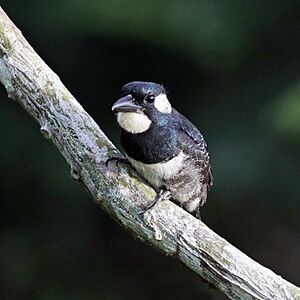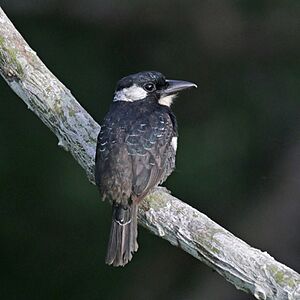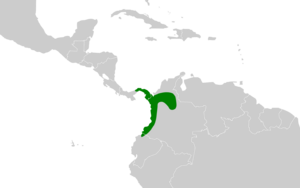Black-breasted puffbird facts for kids
Quick facts for kids Black-breasted puffbird |
|
|---|---|
 |
|
 |
|
| In Panama | |
| Conservation status | |
| Scientific classification |
|
| Kingdom: | Animalia |
| Phylum: | Chordata |
| Class: | Aves |
| Order: | Piciformes |
| Family: | Bucconidae |
| Genus: | Notharchus |
| Species: |
N. pectoralis
|
| Binomial name | |
| Notharchus pectoralis (Gray, 1846)
|
|
 |
|
| Script error: The function "autoWithCaption" does not exist. | |
Script error: No such module "Check for conflicting parameters".
The black-breasted puffbird (Notharchus pectoralis) is a cool bird. It belongs to a family called Bucconidae. These birds are known as puffbirds, nunlets, and nunbirds. You can find this bird in countries like Colombia, Ecuador, and Panama.
Contents
About the Black-breasted Puffbird
This bird is a unique type of puffbird. It is the only one of its kind, which means it is "monotypic." It is also closely related to the brown-banded puffbird. Some scientists think they are part of a "superspecies." This means they are very similar birds.
What Does It Look Like?
The black-breasted puffbird is about 19 to 23 cm (7.5 to 9.1 in) long. It weighs between 60 and 69 g (2.1 and 2.4 oz). Its feathers are mostly shiny blue-black. It has a white collar around its neck. Its cheeks, throat, and belly are also white. There is a blue-black band across its chest. Its tail is black with white tips on the feathers.
When its wings are closed, you can see narrow white marks. Its sides are dark gray with some buffy (light brownish-yellow) spots. The bird has a heavy black beak. Its feet are black, and its eyes are dark brown or red. Male and female puffbirds look the same. Young birds' feathers have not been described yet.
Where Does It Live?
The black-breasted puffbird lives in a specific area. You can find it from the Canal Zone in Panama. Its range goes east into central Colombia. It also extends south through western Colombia into northwestern Ecuador.
This bird likes to live in humid lowland rainforests. It also lives in secondary forest, which is forest that has grown back. It can be found from sea level up to 1,000 m (3,300 ft) high. It usually stays deep inside the forest. It is not often seen near the edges of forests. These birds are often found near running water. They usually stay high up in the trees. But they will fly down to the forest floor. They do this to catch prey that army ant swarms have scared out.
How It Behaves
Hunting for Food
The black-breasted puffbird is a clever hunter. It waits on a perch, like a tree branch. When it spots prey, it dives down to catch it. It also follows army ant swarms. These ants stir up insects and other small creatures. After catching its meal, the puffbird beats it against its perch. This makes the prey easier to eat.
It eats many different kinds of creatures. These include centipedes and millipedes. It also eats scorpions, spiders, and cockroaches. Mantises, grasshoppers, beetles, and even small lizards are on its menu.
Raising Young
The black-breasted puffbird has a breeding season. In Colombia, it is from March to May. In Panama, it is from March to July. Both parent birds work together. They dig a nesting burrow. This burrow is usually in a tree-dwelling termitarium (a termite nest). These nests are typically high up, from 2.3 to 12.5 m (7.5 to 41 ft) off the ground.
A female puffbird usually lays three eggs. However, only two young birds have been seen leaving the nest at a time. Both parents take turns sitting on the eggs. This helps keep the eggs warm until they hatch.
What Does It Sound Like?
The black-breasted puffbird has a unique song. It starts with "10–30 loud 'kwee' whistles." Then it makes "3 or so lower, slower 'whew' whistles." The song ends with a few fading "wheet-whew" sounds, like a wolf-whistle. It also makes a "rasping 'chah-chah-chah'" call. This call is used when it is defending its territory.
Conservation Status
The IUCN (International Union for Conservation of Nature) has checked on the black-breasted puffbird. They have assessed it as being of Least Concern. This means it is not currently considered endangered. The bird lives across a large area. Its population has at least 50,000 adult birds. However, this number is thought to be going down.
The species is generally not very common. But it might be hard to spot because it often stays very still for hours. Losing its natural home is a threat to this bird.
 | James Van Der Zee |
 | Alma Thomas |
 | Ellis Wilson |
 | Margaret Taylor-Burroughs |


